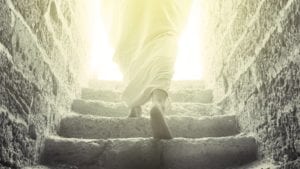
The resurrection of the dead was revealed through Divine Revelation, and it makes us realize that our human bodies are more than just a collection of cells and chemical compounds. It makes us realize that in God’s plan, even as the soul is separated from the body at the time of death, both are meant to be reunited one day for all eternity.
We only need to look at the Resurrection of Christ – Christ’s Resurrection is not a resurrection of a dead body back to life which will eventually die again, as in the case of the raising of Lazarus (John 11:1-57), or the daughter of Jairus (Mark 5:21-43, Luke 8:40-56), or the son of the widow of Nain (Luke 7:11-17). Christ rose from the dead with an immortal body; He rose from the dead with a glorified body which will never ever die.
Luke chapter 20 presents us with the challenge of the Sadducees; they too did not believe in the resurrection of the dead:
- The Sadducees were powerful Jewish priests who were also wealthy aristocrats. They only accepted the Pentateuch as scripture.
- Their question to Jesus about Levirate marriage was intended to mock the resurrection of the dead. What will happen then to women in this particular case? Whose wife will she become? Can’t you see the problems associated with the belief of the resurrection of the dead?
- Jesus’ answer refutes the Sadducees.
- First, there is no problem with the resurrection of the dead because there will be no need for marriage in the age to come. In the age to come, they will no longer marry because they can no longer die. (Luke 20:35-36) The main goal of marriage is to procreate; but in the age to come, since they will no longer die, there will no longer be any need for marriage and procreation.
- Second, Jesus refutes the belief of the Sadducees that death is the end of existence. Jesus quotes from the Book of Exodus 3:6; God said to Moses in the burning bush: “I AM the God of your father, the God of Abraham, the God of Isaac, and the God of Jacob.” Jesus points out this statement meant that God is not the God of the dead, but of the living. All three patriarchs may no longer be alive on earth, but they continue to exist in the immortality of their souls.
In the Book of Maccabees, which tells the story of the Maccabean revolt during the 2nd century BC, the Seleucid king Antiochus IV Epiphanes, in an attempt to force Greek customs and beliefs upon the Jews, compelled them to break the Law of their fathers. Chapter 7 of the Second Book of Maccabees describes the brutal martyrdom of the Maccabean brothers; more importantly, however, it attests to the belief of the resurrection of the dead. The fourth brother proclaimed: “It is my choice to die at the hands of men with the hope God gives of being raised up by him; but for you, there will be no resurrection to life.” (2 Mac 7:14)
The words of the fourth Maccabean brother would later come back to life, because two centuries later, when the Jews began to persecute Jesus after He had cured a man who had been ill for 38 years by the pool in Bethsaida on the Sabbath, Jesus said to the Jews: “The hour is coming in which all who are in the tombs will hear his voice and will come out, those who have done good deeds to the resurrection of life, but those who have done wicked deeds to the resurrection of condemnation.” (John 5:28-29)
Because of Christ, Christian death has a positive meaning. St. Paul articulates it in these words: “For to me to live is Christ, and to die is gain.” (Phil 1:21) and “The saying is sure: if we have died with him, we will also live with him.” (2 Tim 2:11) The essential difference about Christian death is this: through Baptism, the Christian has already “died with Christ” sacramentally, in order to live a new life; and if we die in Christ’s grace, physical death completes this “dying with Christ” and so completes our incorporation into him in his redeeming act. (CCC 1010)
The Church encourages us to prepare ourselves for the hour of our death. In the ancient Litany of the Saints, for instance, we pray: “From a sudden and unforeseen death, deliver us, O Lord.” In the Hail Mary, we also ask the Mother of God to intercede for us “at the hour of our death.” We can also ask for the intercession of St. Joseph, who is the patron saint of a happy death. (CCC 1014)